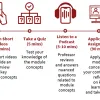Curriculum
Plan, prepare, and practice coaching skills for managers using a proven, research-backed framework.
Coaching is a transformational experience, whether you’re on the giving or receiving side, which is why it’s an essential skill for managers to get right. The curriculum for Coaching Skills for Effective Leadership gives you a proven framework developed by practitioners and Stanford GSB faculty with immersive assignments to help you apply skills to real-world coaching conversations. The EFECT (Engage, Frame, Explore, Commit, and Test) framework walks you through the steps and skills needed to have effective coaching conversations. It makes coaching skills for managers more concrete and actionable. You’ll gain both the knowledge and skills to promote the personal growth of your team members, the excellence of your organization, and the strength of your leadership.
What You Will Learn
Module 1: Engage
- Understand how dialogue and cognitive and implicit biases impact coaching.
- Identify personal biases and leadership hot-buttons as an important step to engaging others in a coaching conversation.
- Analyze effective ways to build trust, the potential obstacles to engagement, and strategies for resolving them.
- Key assignment: Activate your coaching experience by reflecting on a previous coaching conversation. Consider how you set goals with your employee and evaluate your own level of engagement.
Module 2: Frame
- Develop skills to be a more active, engaged, and empathetic listener.
- Discover ways to guide the framing of issues to promote clarity and agency.
- Recognize the contextual and personal elements that can affect the coaching conversation.
- Key assignment: Tune into an actual coaching conversation conducted by one of the course instructors. Tackle questions to develop your understanding of the Frame stage and receive course facilitator feedback on your answers.
Module 3: Explore
- Learn strategies for asking questions to support the employee’s exploration of potential courses of action.
- Formulate multiple coaching questions that consider the impact of the employee’s perspective and their position in the organization.
- Understand the potential negative effects of power differentials and performance evaluations.
- Key assignment: Listen to an actual coaching conversation conducted by one of the course instructors and answer reflection questions to understand how the Explore stage can lead to effective solutions.
Module 4: Commit and Test
- Help employees plan a course of action to solve a problem, recognizing common challenges to behavioral change.
- Create effective accountability mechanisms that consider the employee’s objectives.
- Follow up and re-engage with the employee for the next steps in the coaching process.
- Key assignment: Develop a plan, conduct, and answer reflection questions about your own coaching conversation, applying the tools and techniques you learned in the course. Receive course facilitator feedback on all aspects of the assignment.
Learning Model
This on-demand, online course is offered in four modules. Each module combines theory and practice with assignments that turn course learnings into real-time results. Course content includes videos, interactive presentations, workbook, experiential exercises, and personal feedback on key assignments to help you apply what you learn.
After you register, you will unlock course material for 60 days and can save select materials for future reference.


